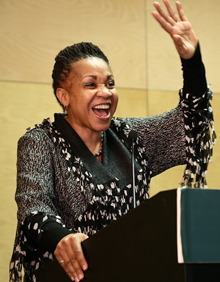Collective trauma from slavery still endures
“This will be intense because it is intense,” presaged author and educator Joy DeGruy as she began her keynote address at the Tulane University Office of Multicultural Affairs' 15th annual Diversity Convocation on Wednesday (Oct. 30.) The topic was DeGruy's 2005 book, Post Traumatic Slave Syndrome: America's Enduring Legacy of Injury and Healing.

Author Joy DeGruy greets the audience at the annual Diversity Convocation on Wednesday (Oct. 30) on the Tulane University uptown campus. (Photo by Guillermo Cabrera-Rojo)
DeGruy provided an example. At a school event, a black parent compliments a white parent on her child's development, and the white parent beams and brags about her child, then compliments the black parent on her child, who is even further along in his development. The black parent brushes the compliment aside, complaining that the child drove her up the wall yesterday.
DeGruy, an assistant professor of social work at Portland State University, said this response stems from generations of slave parents who would denigrate their offspring to protect them from the hungry eyes of slave owners who wanted to sell or breed them.
Her book examines how the pillars of European-American society science, medicine, politics, law, religion and education sought to avert the cognitive dissonance of holding enlightened views of humanity while brutalizing slaves and Native Americans. The solution to this cognitive dissonance, said DeGruy, was to dehumanize Africans and other races, thereby justifying their enslavement and mistreatment.
The abolition of slavery did not wipe away the centuries of dehumanization, DeGruy said. Understanding the history of slavery and its current effects can help break the cycle of “socially learned brokenness” and prevent the transmission of trauma to the next generation. These and other steps, which DeGruy called “cultural preparation for the future,” can help eliminate post-traumatic slave syndrome.
Alex Chasick, a freelance writer living in New Orleans, is a 2005 graduate of Tulane University.
